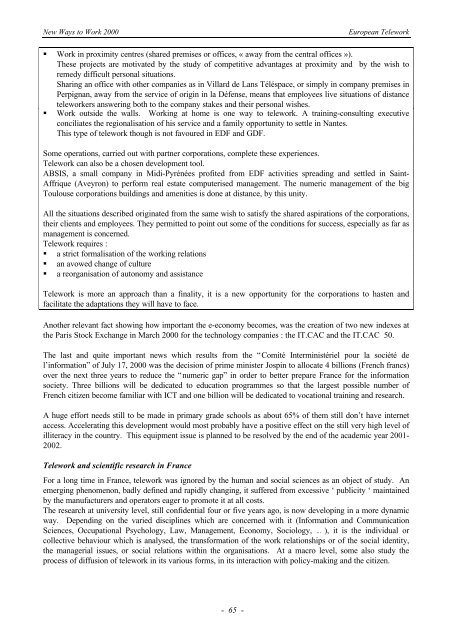eWORK 2000 - European Telework Week
eWORK 2000 - European Telework Week
eWORK 2000 - European Telework Week
- No tags were found...
Create successful ePaper yourself
Turn your PDF publications into a flip-book with our unique Google optimized e-Paper software.
New Ways to Work <strong>2000</strong><strong>European</strong> <strong>Telework</strong>• Work in proximity centres (shared premises or offices, « away from the central offices »).These projects are motivated by the study of competitive advantages at proximity and by the wish toremedy difficult personal situations.Sharing an office with other companies as in Villard de Lans Téléspace, or simply in company premises inPerpignan, away from the service of origin in la Défense, means that employees live situations of distanceteleworkers answering both to the company stakes and their personal wishes.• Work outside the walls. Working at home is one way to telework. A training-consulting executiveconciliates the regionalisation of his service and a family opportunity to settle in Nantes.This type of telework though is not favoured in EDF and GDF.Some operations, carried out with partner corporations, complete these experiences.<strong>Telework</strong> can also be a chosen development tool.ABSIS, a small company in Midi-Pyrénées profited from EDF activities spreading and settled in Saint-Affrique (Aveyron) to perform real estate computerised management. The numeric management of the bigToulouse corporations buildings and amenities is done at distance, by this unity.All the situations described originated from the same wish to satisfy the shared aspirations of the corporations,their clients and employees. They permitted to point out some of the conditions for success, especially as far asmanagement is concerned.<strong>Telework</strong> requires :• a strict formalisation of the working relations• an avowed change of culture• a reorganisation of autonomy and assistance<strong>Telework</strong> is more an approach than a finality, it is a new opportunity for the corporations to hasten andfacilitate the adaptations they will have to face.Another relevant fact showing how important the e-economy becomes, was the creation of two new indexes atthe Paris Stock Exchange in March <strong>2000</strong> for the technology companies : the IT.CAC and the IT.CAC 50.The last and quite important news which results from the “Comité Interministériel pour la société del’information” of July 17, <strong>2000</strong> was the decision of prime minister Jospin to allocate 4 billions (French francs)over the next three years to reduce the “numeric gap” in order to better prepare France for the informationsociety. Three billions will be dedicated to education programmes so that the largest possible number ofFrench citizen become familiar with ICT and one billion will be dedicated to vocational training and research.A huge effort needs still to be made in primary grade schools as about 65% of them still don’t have internetaccess. Accelerating this development would most probably have a positive effect on the still very high level ofilliteracy in the country. This equipment issue is planned to be resolved by the end of the academic year 2001-2002.<strong>Telework</strong> and scientific research in FranceFor a long time in France, telework was ignored by the human and social sciences as an object of study. Anemerging phenomenon, badly defined and rapidly changing, it suffered from excessive ‘ publicity ‘ maintainedby the manufacturers and operators eager to promote it at all costs.The research at university level, still confidential four or five years ago, is now developing in a more dynamicway. Depending on the varied disciplines which are concerned with it (Information and CommunicationSciences, Occupational Psychology, Law, Management, Economy, Sociology, … ), it is the individual orcollective behaviour which is analysed, the transformation of the work relationships or of the social identity,the managerial issues, or social relations within the organisations. At a macro level, some also study theprocess of diffusion of telework in its various forms, in its interaction with policy-making and the citizen.- 65 -








